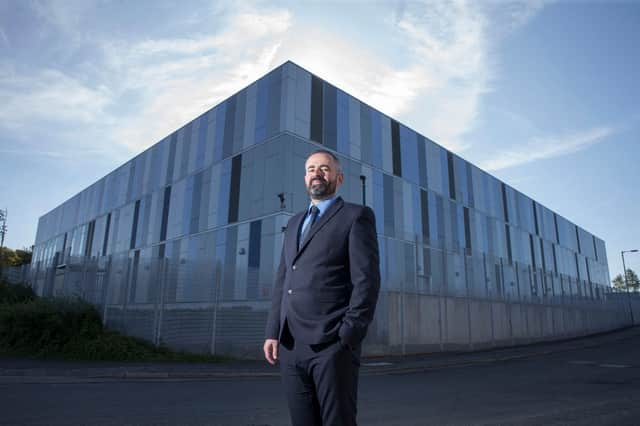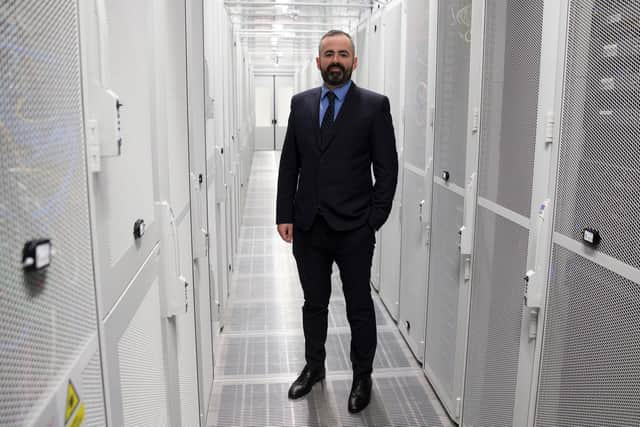The Big Interview: DataVita managing director Danny Quinn


He had joined the organisation in 2015 as director, having previously held roles at technology company Proact, and law firms including Shepherd and Wedderburn.
DataVita, which is part of commercial property and investment company HFD, says it aims to be at the heart of Scotland’s digital economy. It has a purpose-built datacentre, which is located just off the M8 and offers co-location hosting and integrated cloud services, and a consultancy side offering enterprise-class IT innovation and transformation services.
Advertisement
Hide AdAdvertisement
Hide AdA year ago it hailed a 76 per cent jump in revenue in 2019 amid a push to triple the size of the business, with Mr Quinn saying at the time: “Datacentre and hybrid cloud services are a major priority for Scottish businesses – and as our digital economy grows, the demand for our services will only intensify.”


Can you explain what your role involves and what DataVita does – how is it supporting Scotland’s digital economy?
There are two parts to DataVita. First, there’s Scotland’s only purpose-built data centre, which stores around 4,000 racks of networking and server equipment on behalf of businesses and public sector organisations from across the UK. Data centres can be looked at as a fourth utility – along with water, power and gas – and are a critical component of the economy, particularly as we become a digital-first society.
A bit like an oil refinery, it’s one of these hidden industries that play a crucial role in the technologies that make businesses, services, and – increasingly the case – society function. Not everyone appreciates why it’s needed, but if data centres weren’t there you’d soon notice. Our Lanarkshire-based facility supports the services and data for an estimated two million people in Scotland – around a third of the population.
The second part of DataVita is the services business, which offers a range of IT services, including cloud computing, connectivity, security, back-up and disaster recovery. Every customer has different requirements, particularly in terms of compliance, protection, security and more recently sustainability, and we help them develop a strategy that meets their needs. The aim is to remove the stress and complexities of IT, enabling companies to focus on core business goals instead of managing IT.
It’s a cliché, but as managing director no two days are the same. I’m heavily involved with customer relations and new business development, but there’s also the technical and operational side that are equally important – our services have to be available every hour of every day.
To what extent has demand for DataVita’s activity been altered by the pandemic?
Resilience and continuity planning have always been core elements of our business. Ensuring that DataVita operates as normal means that, in turn, our customers can do the same – or as close to normal as they can.
Advertisement
Hide AdAdvertisement
Hide AdSince March last year, the organisations we work with have come to us with various challenges related to remote working, particularly if their offices previously played a key role in supporting their network and data storage. Some organisations were initially locked out of their buildings, causing a real challenge in terms of access to critical physical equipment. In fact, during the first lockdown we helped many companies move to a new data centre – an exercise that takes a lot of planning under normal circumstances, let alone with Covid-19 restrictions.
The pandemic has accelerated many of the trends in the ways we live, work and interact with different services. For years, there has been lots of talk of moving to the cloud, but there are still many companies that rely on office-based infrastructure, and the pandemic has highlighted some of the issues with that.
There is a new demand for flexible and resilient IT that can continue to support a remote workforce and withstand the impact of lockdown. Continuity planning will likely be an ongoing concern for businesses as we return to some sense of normality.
DataVita has said it wants to grow its services capabilities – can you give more details on this?
Scottish citizens, businesses and public services are in the midst of a digital transformation, which is no mean feat for the people and IT teams involved in transferring services, records and data to digital formats. There are complex decisions to make and detailed strategies involved with building an IT system fit for the future, and it can be difficult to know where to start.
We can provide support in different ways, depending on the needs of each organisation. It could be one-off support for a company-wide digital change programme, or a regular consultation with our experts. For small and medium-sized enterprises in particular, where IT departments may be limited to one or two people expected to handle all aspects of technology, we can become an extension of the team and provide varying levels of support as and when it is required.
The cloud, security, and connectivity services we offer are fully integrated with our data centre and more importantly, other cloud providers such as Google, Amazon and Microsoft, meaning companies have the option to streamline IT provision and deal with one point of contact that can handle all aspects under one roof. There is a range of benefits that come with having that level of integration, from ease of communication to efficiencies and potential cost savings.
DataVita's data centre is harnessing renewable energy and the firm has become the first in Scotland to sign the Climate Neutral Data Centre Pact. You've spoken about the importance of sustainability – can you expand on this?
Advertisement
Hide AdAdvertisement
Hide AdData centres are large consumers of energy, in terms of the power used to operate, cool and maintain the equipment stored, but there’s a real opportunity to make positive changes that ensure facilities are as environmentally friendly as possible. They are a critical part of our digital infrastructure, but it is incumbent on everyone in the industry to create new processes and technologies, and design new data centres that reduce the carbon footprint.
Signing up to the Climate Neutral Data Centre Pact is just one part of a larger initiative to boost our sustainability. For instance, plans are already in progress to move to 100 per cent renewable energy sources with electricity generated by wind power and supported by battery-powered back-up systems.
We also use Scotland’s cold and grey climate to our advantage, using natural air to maintain optimum temperatures in a refrigerant-free air-cooling system, instead of air conditioning units that consume vast amounts of energy. As a result, the data centre has a remarkably low power usage effectiveness (PUE) ratio, of just 1.18 – well below the industry average of 2.0. This has a real benefit to anyone using our data centre as it can reduce energy bills substantially, as well as making a real improvement to their carbon footprint.
Cybersecurity is a huge concern for organisations, with Sepa recently making the headlines for being subjected to a cyber attack. How is DataVita tackling the issue, for example you say you have access to a large team of threat researchers and analysts…
The issue is that as IT systems become more sophisticated, so do the people that want to cause harm and the methods they might use to cause disruption. In that respect, it’s important we stay ahead of the curve and take a proactive approach to cyber security.
We have a number of advanced automated monitoring tools and a team of analysts that provide intelligence on the latest threats and risks, which allows us to respond quickly to protect our customers’ data. We know that prevention is far better than cure, however, and continuously adapt and refine our processes and policies in line with the most advanced threats from around the world.
Physical security and safety are also important elements of protecting data, and we have strict access restrictions and a dedicated security team in place 24/7 to mitigate any risks. Our data centre is a purpose-built facility, which means the location was carefully selected to avoid any hazardous neighbours or potential issues from even unlikely events such as flooding or vehicles crashing, among other factors. When older buildings, such as warehouses or vacant office blocks, are converted to be used as data centres it can present some challenges in that respect.
How did your career progress before your current role?
I previously worked for Proact – an international technology company founded in Sweden – and launched its Scottish office in 2008. When I started it only had two employees, but by the end of my time there I had grown the team to 70 and increased the company’s presence in Scotland. My career began in engineering, however, and I started out as a solutions architect, working for a number of corporate and professional services firms.
Advertisement
Hide AdAdvertisement
Hide AdWhat would you like DataVita to look like in 2025, the year of its tenth anniversary?
Our goal is to continue to help organisations to transform how they consume IT services, while expanding our footprint to the wider UK and beyond. Our success in Scotland has shown that technology businesses have much to offer global organisations, making Scotland the perfect home for any company from a technology perspective.
By 2025, we expect DataVita to have grown to five times its current size (and ideally more) – this growth is significant, but it is achievable.
We are also keen to add our weight to the drive for carbon neutral operations and intend to use this as a major focus area. Sustainability will continue to be a key priority for the business, and across the wider HFD Group. We still have a long way to go to reach Scotland’s net-zero target but with COP26 due to be hosted in Glasgow later this year, the conversation is gaining momentum in every industry.
At DataVita, we expect to reach a significant milestone next year by taking the data centre operations off the grid and making the switch to 100 per cent renewable electricity. Our ambition is to be the go-to for any business looking for carbon-free IT operations.
A message from the Editor:
Thank you for reading this article. We're more reliant on your support than ever as the shift in consumer habits brought about by coronavirus impacts our advertisers.
If you haven't already, please consider supporting our trusted, fact-checked journalism by taking out a digital subscription.
Comments
Want to join the conversation? Please or to comment on this article.